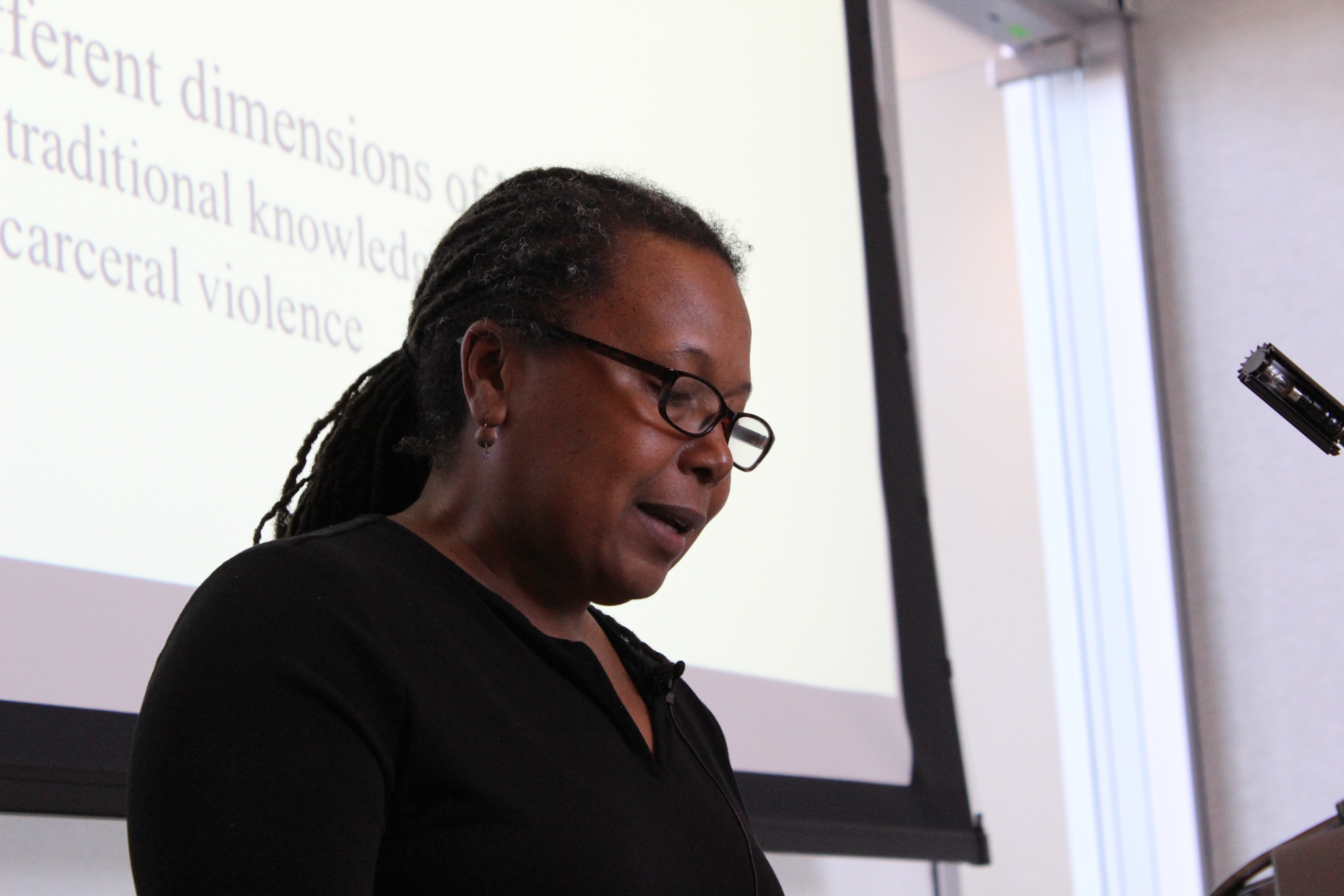University of Chicago professor Cathy Cohen’s talk on April 13 as part of the Research to Impact series began with two essential questions: what is political knowledge?; and how does race/ethnicity shape the different types of political knowledge used in communities?
According to Cohen, political knowledge is multi-dimensional and goes beyond the conventional conception of liberal democratic participation to include another type of political knowledge that is particularly germane to the experience and political existence of Black Americans: carceral violence. When political knowledge is defined in the unconventional terms of state violence, popular beliefs about Black political knowledge are challenged. Rather than considering Black people to be less politically knowledgeable than white people, we can recognize the different types of political knowledge that motivate different forms of political participation among Black Americans. By identifying the carceral state as a second critical dimension of political knowledge, Cohen brings to the fore the interactions between marginalized communities and the state that produce different types and uses of political knowledge.
Knowledge of the carceral state is a more relevant form of political knowledge among Black youth, and new media is the primary tool through which this knowledge is developed and disseminated. Cohen draws a historical parallel between the role of visual arts in the Civil Rights Movement, the “groundbreaking and heart-wrenching” images of Emmett Till, and the more recent video images of the police beating of Rodney King in order to convey the ongoing significance of media technology in documenting Black suffering and resistance, and in producing political knowledge. With technology, ordinary people have the means and ability to film, edit, and disseminate information online without mass media gatekeeping, and this process produces a unique type of digital knowledge and political acumen.
According to Cohen, the carceral state and new media produce a Black social media sphere wherein the carceral face of government is actively reveled. In addition to facilitating the mass distribution of images of Black death and harassment, social media also produces a sense of connection to a larger Black community. Because communities of color disproportionately experience and witness violence, Cohen contends that these communities have a greater knowledge of the carceral state, and are highly politically knowledgeable.
Using data from the third wave of the 2015 Youth and Participatory Politics Survey, and additional questions to measure group-based differences in levels of carceral violence knowledge, Cohen identified statistically significant Black-white and white-Latinx differences in levels of conventional and carceral knowledge. Notably, a relationship between political knowledge and frequency of internet access was found: the more internet use the more knowledge a respondent had across both domains of carceral and conventional political knowledge. According to Cohen, young people of color consumed more images of state violence than whites and, a type of online homophily appeared to operate whereby the more knowledge about victims of carceral violence that whites and Latinx respondents had, the less likely they were to engage online with other white and Latinx peers. Cohen described this internet effect as a type of “racial echo chamber” that leads to the polarization of political knowledge, and a different impact of carceral political knowledge for Black people. Of the three groups, Black people were most knowledgeable of carceral violence, most likely to engage with peers highly knowledgeable of carceral violence, and least likely to engage in conventional forms of political participation.
In addition to expanding the conception of political knowledge to be more inclusive, Cohen’s research also expands our understanding of political education, political participation, and the myriad ways that communities engage in civic activity. More specifically, this research challenges the dominant narratives regarding Black people as fully-engaged citizens because it suggests that carceral violence does not automatically and exclusively extinguish Black civic engagement. It can also serve to consolidate Black political knowledge and motivate diverse forms of self-efficacy, determination, and civic participation.
Cathy J. Cohen is the David and Mary Winton Green Professor at the University of Chicago. Cohen is the author of two books, The Boundaries of Blackness: AIDS and the Breakdown of Black Politics (University of Chicago Press) and Democracy Remixed: Black Youth and the Future of American Politics (Oxford University Press). She is also co-editor of the anthology Women Transforming Politics: An Alternative Reader (NYU Press) with Kathleen Jones and Joan Tronto. Her articles have been published in numerous journals and edited volumes including the American Political Science Review, NOMOS, GLQ, Social Text, and the DuBois Review. Cohen is the founder and director of the GenForward Millennial Survey Project and the Black Youth Project. She is also co-editor with Frederick Harris of a book series at Oxford University Press entitled “Transgressing Boundaries: Studies in Black Politics and Black Communities.” Cohen has also been the recipient of numerous awards including the Robert Wood Johnson Investigator’s Award and the Robert Wood Johnson Scholars in Health Policy Research Fellowship.


